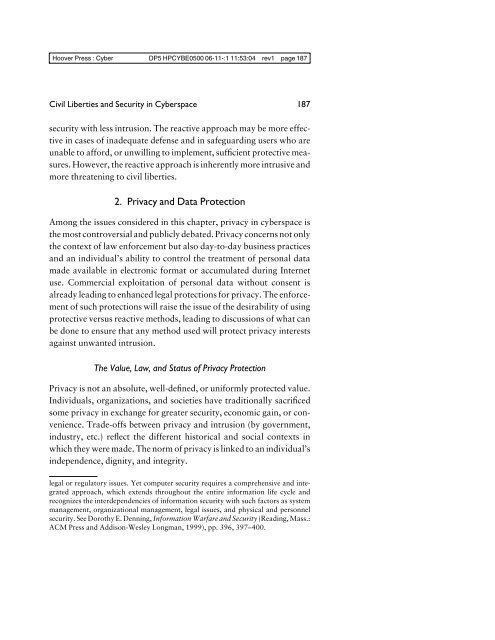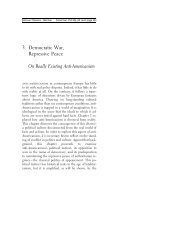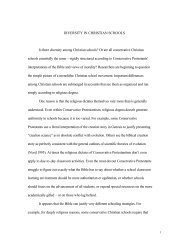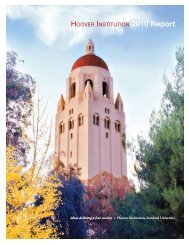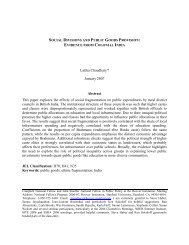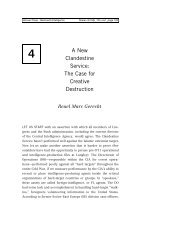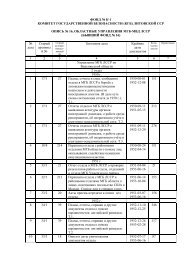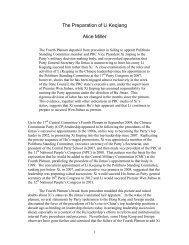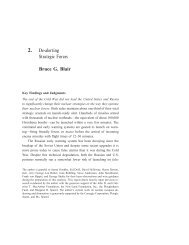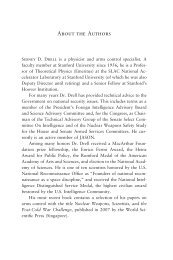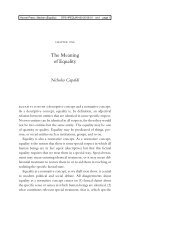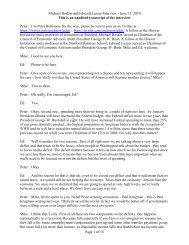Civil Liberties and Security in Cyberspace - Hoover Institution
Civil Liberties and Security in Cyberspace - Hoover Institution
Civil Liberties and Security in Cyberspace - Hoover Institution
You also want an ePaper? Increase the reach of your titles
YUMPU automatically turns print PDFs into web optimized ePapers that Google loves.
<strong>Hoover</strong> Press : Cyber DP5 HPCYBE0500 06-11-:1 11:53:04 rev1 page 187<br />
<strong>Civil</strong> <strong>Liberties</strong> <strong>and</strong> <strong>Security</strong> <strong>in</strong> <strong>Cyberspace</strong><br />
security with less <strong>in</strong>trusion. The reactive approach may be more effective<br />
<strong>in</strong> cases of <strong>in</strong>adequate defense <strong>and</strong> <strong>in</strong> safeguard<strong>in</strong>g users who are<br />
unable to afford, or unwill<strong>in</strong>g to implement, sufficient protective measures.<br />
However, the reactive approach is <strong>in</strong>herently more <strong>in</strong>trusive <strong>and</strong><br />
more threaten<strong>in</strong>g to civil liberties.<br />
2. Privacy <strong>and</strong> Data Protection<br />
Among the issues considered <strong>in</strong> this chapter, privacy <strong>in</strong> cyberspace is<br />
the most controversial <strong>and</strong> publicly debated. Privacy concerns not only<br />
the context of law enforcement but also day-to-day bus<strong>in</strong>ess practices<br />
<strong>and</strong> an <strong>in</strong>dividual’s ability to control the treatment of personal data<br />
made available <strong>in</strong> electronic format or accumulated dur<strong>in</strong>g Internet<br />
use. Commercial exploitation of personal data without consent is<br />
already lead<strong>in</strong>g to enhanced legal protections for privacy. The enforcement<br />
of such protections will raise the issue of the desirability of us<strong>in</strong>g<br />
protective versus reactive methods, lead<strong>in</strong>g to discussions of what can<br />
be done to ensure that any method used will protect privacy <strong>in</strong>terests<br />
aga<strong>in</strong>st unwanted <strong>in</strong>trusion.<br />
The Value, Law, <strong>and</strong> Status of Privacy Protection<br />
187<br />
Privacy is not an absolute, well-def<strong>in</strong>ed, or uniformly protected value.<br />
Individuals, organizations, <strong>and</strong> societies have traditionally sacrificed<br />
some privacy <strong>in</strong> exchange for greater security, economic ga<strong>in</strong>, or convenience.<br />
Trade-offs between privacy <strong>and</strong> <strong>in</strong>trusion (by government,<br />
<strong>in</strong>dustry, etc.) reflect the different historical <strong>and</strong> social contexts <strong>in</strong><br />
which they were made. The norm of privacy is l<strong>in</strong>ked to an <strong>in</strong>dividual’s<br />
<strong>in</strong>dependence, dignity, <strong>and</strong> <strong>in</strong>tegrity.<br />
legal or regulatory issues. Yet computer security requires a comprehensive <strong>and</strong> <strong>in</strong>tegrated<br />
approach, which extends throughout the entire <strong>in</strong>formation life cycle <strong>and</strong><br />
recognizes the <strong>in</strong>terdependencies of <strong>in</strong>formation security with such factors as system<br />
management, organizational management, legal issues, <strong>and</strong> physical <strong>and</strong> personnel<br />
security. See Dorothy E. Denn<strong>in</strong>g, Information Warfare <strong>and</strong> <strong>Security</strong> (Read<strong>in</strong>g, Mass.:<br />
ACM Press <strong>and</strong> Addison-Wesley Longman, 1999), pp. 396, 397–400.


